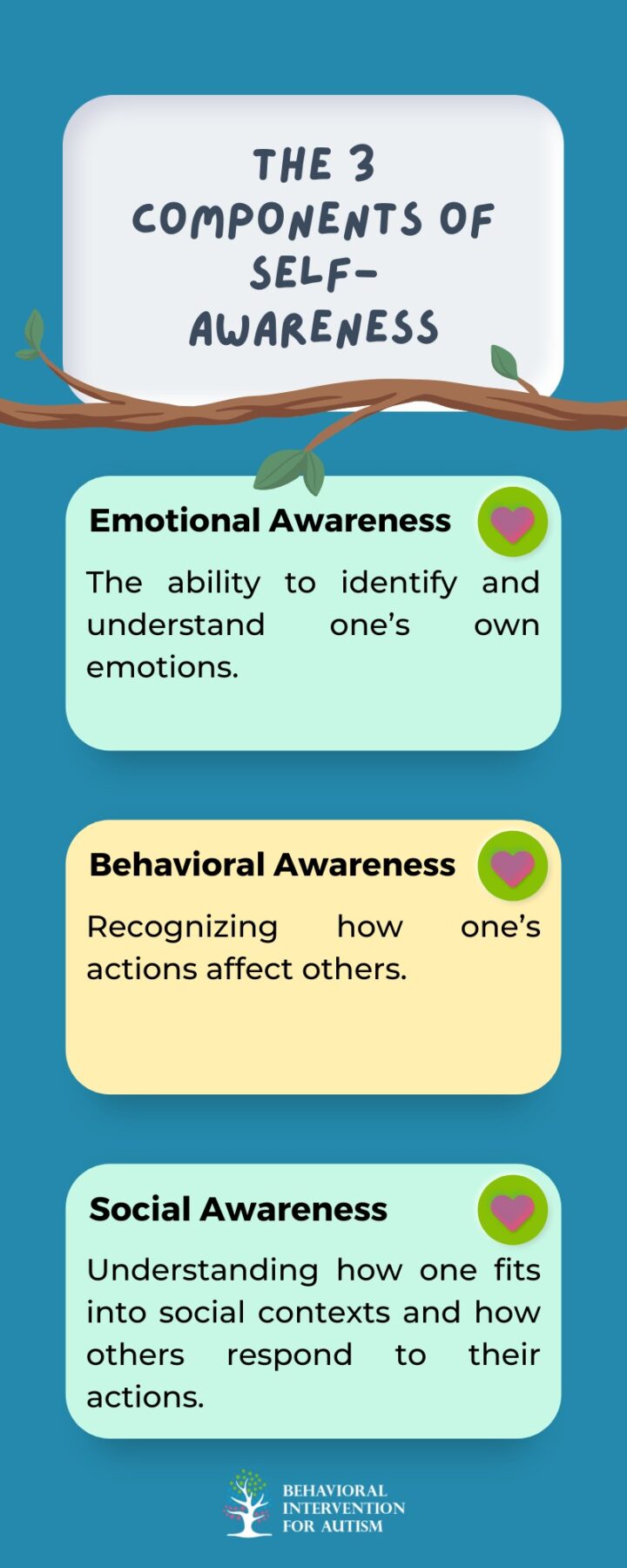
Table of Contents
Self-awareness is a critical aspect of human development, playing a vital role in understanding one’s thoughts, emotions, and behaviors. For individuals on the autism spectrum, however, a lack of self-awareness can present unique challenges in daily life, particularly in relation to their mental health. Understanding how self-awareness functions and how its absence affects people with autism spectrum disorder (ASD) is crucial for providing appropriate support and interventions.
In this article, we will explore the different dimensions of self-awareness, how it manifests in people with autism, and the effects it has on behavior and social interaction. We will also discuss strategies that can help individuals with autism improve their self-awareness, promoting better social and emotional functioning.
What is Self-Awareness?
Self-awareness is defined as the ability to recognize and understand one’s own emotions, thoughts, and behaviors. It enables people to reflect on their actions, make adjustments when necessary, and develop a sense of self. In the context of autism, self-awareness may be underdeveloped or delayed, which can impact social interactions, emotional regulation, and overall well-being.
While self-awareness is a gradual process that typically develops during childhood, individuals with autism may face barriers in this area. These barriers can lead to difficulties in understanding their own feelings and behaviors, as well as challenges in recognizing how others perceive them.
The 3 Components of Self-Awareness
Self-awareness involves several components:

In individuals with autism, these components may develop unevenly. For example, a person with autism may have difficulty recognizing their emotional responses or may not fully understand how their actions influence social dynamics. This lack of self-awareness can make it harder for them to navigate complex social situations and emotional experiences.
The Link Between Autism and Self-Awareness
Autism spectrum disorder (ASD) is characterized by deficits in social communication, interaction, and the presence of repetitive behaviors. One of the core features of ASD is difficulty with social cognition, which refers to the ability to understand and interpret social cues and interactions. Since self-awareness is closely tied to social cognition, individuals with autism may struggle with self-awareness as well.
Social Cognition and the Lack of Self-Awareness
Self-awareness involves not only recognizing one’s own emotions and actions but also understanding how those emotions and actions are perceived by others. Social cognition—the ability to perceive and interpret social information—is critical for this process. When social cognition is impaired, individuals may struggle with empathy, perspective-taking, and understanding social norms, all of which are closely linked to self-awareness.
For example, someone with autism may have difficulty understanding that their tone of voice, facial expressions, or body language can affect how others feel. This can lead to misunderstandings and challenges in forming meaningful relationships.
How Autism Affects Self-Reflection
Self-reflection is another key aspect of self-awareness. It involves thinking about one’s own experiences, behaviors, and emotions. Many individuals with autism may find it challenging to engage in self-reflection due to difficulties with abstract thinking and emotional regulation.
For instance, a person with autism might have trouble recognizing when they are feeling anxious or overwhelmed, making it harder to take steps to manage those emotions. In some cases, they may not realize that their behavior is impacting others negatively, leading to frustration and conflict in social situations.
Common Challenges Associated with Lack of Self-Awareness in Autism
The lack of self-awareness in autism can manifest in various ways, affecting different aspects of life. Here are some of the most common challenges individuals with autism may experience due to underdeveloped self-awareness:
1. Difficulty Regulating Emotions
One of the most noticeable impacts of a lack of self-awareness is difficulty with emotional regulation. Without the ability to recognize their emotions, individuals with autism may struggle to manage feelings like frustration, anxiety, or anger. This can lead to emotional outbursts, withdrawal, or other disruptive behaviors.
For example, a child with autism may not understand why they are feeling upset or may not recognize the physical signs of stress, such as a racing heart or tight chest. This can make it harder for them to use coping strategies to calm down or seek help when needed.
2. Struggles with Social Relationships
Self-awareness is essential for understanding social norms and expectations. When individuals with autism are unaware of their own social behaviors, they may have difficulty building and maintaining relationships with others. They may not recognize when they are engaging in behaviors that are socially inappropriate, such as interrupting others or failing to recognize social cues.
This can lead to social isolation, as peers may find it difficult to relate to or connect with someone who lacks social awareness. In some cases, individuals with autism may also struggle to interpret the behaviors and emotions of others, which can further hinder their ability to form meaningful relationships.
3. Challenges with Communication
Effective communication relies on both self-awareness and the ability to interpret others’ emotions and actions. Individuals with autism often have difficulty with communication, and a lack of self-awareness can exacerbate these challenges. For example, someone with autism may struggle to recognize that their tone of voice sounds angry or that they are not making eye contact, which can create misunderstandings.
This difficulty in recognizing one’s own communication style can make it harder for individuals with autism to adjust their approach in social situations. It may also result in frustration for both the individual and their conversation partners.
Improving Self-Awareness in Autism
While the lack of self-awareness in autism presents unique challenges, there are strategies and interventions that can help individuals with ASD improve their self-recognition and emotional regulation. These strategies can promote greater independence, better social relationships, and improved overall well-being.
1. Social Skills Training
Social skills training is one of the most effective ways to help individuals with autism develop better self-awareness in social situations. This training typically involves teaching individuals how to recognize social cues, understand emotions, and engage in appropriate social behaviors.
For example, social skills training might include role-playing exercises where individuals practice recognizing facial expressions and adjusting their own behavior based on the situation. By practicing these skills in a safe environment, individuals can become more aware of their own actions and how those actions affect others.
2. Mindfulness and Emotional Regulation Techniques
Mindfulness and emotional regulation techniques can also help individuals with autism improve their self-awareness. Mindfulness involves paying attention to the present moment without judgment, which can help individuals recognize and understand their own thoughts and feelings. Practicing mindfulness can lead to greater emotional awareness and better coping strategies when emotions become overwhelming.
In addition to mindfulness, emotional regulation techniques such as deep breathing, progressive muscle relaxation, and cognitive-behavioral strategies can help individuals become more aware of their emotional responses and develop healthier ways of managing stress and frustration.
3. Structured Self-Reflection Activities
Engaging in structured self-reflection activities can help individuals with autism build greater self-awareness. These activities may include journaling, drawing, or using visual aids to track emotions and behaviors throughout the day. By reflecting on their experiences, individuals can begin to recognize patterns in their emotions and behaviors, leading to better self-understanding.
For example, a person with autism might use a mood chart to track their emotions at different times of the day. This can help them identify triggers for certain emotions and learn how to manage those feelings more effectively.
4. Parent and Caregiver Involvement
Parents and caregivers play a crucial role in supporting the development of self-awareness in individuals with autism. By providing guidance, encouragement, and structured opportunities for self-reflection, caregivers can help individuals with autism develop a better understanding of themselves and their emotions.
Caregivers can also help individuals recognize the impact of their behavior on others and encourage them to engage in activities that promote self-awareness, such as social skills training or mindfulness practices. By working together, families can foster a greater sense of self-understanding and emotional regulation.
Self-awareness is a critical skill that influences emotional regulation, social interactions, and overall well-being. For individuals with autism, the lack of self-awareness can present significant challenges in navigating daily life. However, with the right interventions, such as social skills training, mindfulness practices, and structured self-reflection, individuals with autism can improve their self-awareness and enhance their ability to engage with others and manage their emotions.
It is essential to recognize the unique needs of individuals with autism and provide tailored support that addresses their specific challenges with self-awareness. By fostering an environment that encourages self-reflection and emotional growth, we can help individuals with autism develop the tools they need to thrive in both social and emotional aspects of life.
Take Action Today for Better Self-Awareness
Lack of self-awareness in individuals with autism can impact social interactions and daily functioning. By focusing on developing these skills through structured interventions, we can help individuals improve their understanding of themselves and their environment. Behavioral Intervention For Autism offers specialized ABA programs in Florida that focus on promoting self-awareness and empowering individuals with autism. Our expert team tailors each program to meet the unique needs of the individual, ensuring that every client receives personalized, effective support. Interested in learning how we can help? Reach out to us today to discover how our services can make a lasting difference!
Sources:
https://pmc.ncbi.nlm.nih.gov/articles/PMC7874376/
https://www.intechopen.com/chapters/41296
https://www.frontiersin.org/journals/psychology/articles/10.3389/fpsyg.2017.01422/full
- 9 Common Obsessions of Children With Autism You Should Know - February 25, 2025
- What is Neurodiversity? A Guide to Embracing Differences - February 25, 2025
- Understanding Hyperfocus in Autism: What It Means and Why It Happens - February 25, 2025


